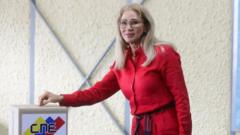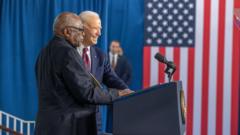The Venezuelan ruling party touts a significant win in regional elections marked by high opposition boycott rates. With reported low voter turnout and widespread allegations of voter suppression, the legitimacy of the elections remains contentious.
Venezuela’s Ruling Party Proclaims Election Triumph Amidst Opposition Boycott

Venezuela’s Ruling Party Proclaims Election Triumph Amidst Opposition Boycott
Ruling party claims electoral victory as opposition largely abstains, raising concerns over legitimacy.
Venezuela's ruling party, the United Socialist Party of Venezuela (PSUV), led by President Nicolás Maduro, is declaring a significant electoral victory following regional and parliamentary elections that were largely boycotted by opposition factions. According to the electoral council or CNE, which is viewed as politically aligned with the government, the PSUV secured the governorship in 23 of the 24 states, as well as capturing 82.68% of the votes for the National Assembly.
Opposition parties characterized the voting process as a "farce," voicing concerns over the legitimacy of the election results. María Corina Machado, a prominent opposition leader, claimed that the voter turnout was below 15%, contrasting sharply with the CNE's reported turnout of 42.6%. Independent observers reported minimal lines and significantly fewer voters compared to the previous presidential election held in July.
This election was set against a backdrop of severe repression against dissenting voices, following the controversial presidential elections where Maduro was declared the winner without providing adequate voting data. The opposition had earlier announced its boycott, emphasizing the need for respecting previous election results before any new elections could legitimately occur. Despite the overall opposition boycott, a few politicians did run, arguing participation was necessary to avoid completely conceding the field to pro-Maduro candidates.
Among those running were well-known opposition figures such as Henrique Capriles and Manuel Rosales. Capriles, distancing himself from the boycott, described voting as an act of resistance. However, this decision drew criticism from figures like Machado, who deemed their participation a betrayal of the anti-government cause.
Despite the apparent victory for the Maduro administration, concerns about the political atmosphere remain, with over 70 opposition-linked individuals arrested on allegations related to election sabotage, which Machado labeled as "state terrorism.” The elections also included contention around representation for the Essequibo territory, claimed by Venezuela but currently in the control of Guyana, further complicating the political landscape.
In this climate of tension and allegations of electoral manipulation, Venezuelan president Maduro hailed the election results as a “victory of peace and stability,” claiming a restored PSUV control over critical states like Zulia. But as calls for international scrutiny grow, the legitimacy of such claims remains cast in doubt amidst ongoing civil unrest and political instability in the country.




















